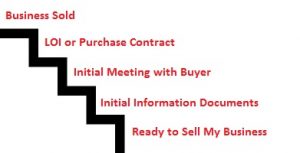
Selling with Your Ears – a Business Broker Perspective.
“Nothing happens in this business until somebody sells something.”
Are you a salesperson? If you are in a small business or a startup I would be stunned if you said no. I have been with several companies throughout my business career, small, medium, and a large Fortune 100 company, some as an employee and some as an owner. My role currently as a business broker is to help people with the process of buying and selling businesses in Anderson South Carolina, Florida, and Southeast USA. . How do you find people wanting to buy a business or sell a business- prospecting.
Whats The First Thing I Do When Meeting This Prospect- Listen.
My job of working with those in the buying and selling of businesses is really really a job of listening. I recall one of my first jobs out of college I was hired by a Fortune 100 company, and they would send all new employees off to corporate headquarters for 45 days of fairly intensive training. Training as a salesman/woman for that company involve quite a bit of technical knowledge on their products along with sales/marketing/time management skills. I studied the technical aspect of this product extensively. I felt when I got in front of a prospective client I just had to let him know all I had learned about this product without really slowing down to hear what they wanted to know. It seems a little silly to me now, but then I felt it was my job to tell them all I knew.
Today, to me, selling is listening to a customers needs and proposing a solution. Today I listen/work as a South Carolina Business Broker. I work with those buying and selling businesses. There is so much that goes into such a complex process that include the emotional side, the financial side, the timing, family, friends, employees, loyalties, that without listening to what a persons true interest is seems so mis-guided.
Overall, I’ve found Salespeople can seem to be looked at in a negative way by other departments within an organization, can be looked at disparagingly thru movies and stories, but my perspective on sales process or the sales person is a little different. I have a strong admiration of those involved with the sales process. The sales process can be defined in many different ways from taking orders over the phone to the full cycle process of identifying a target market, prospecting that target market, approaching that target market, and ultimately trying to parlay those contacts into gainful customers. The production department, or the service department may not like all the actions of the sales department, but very often the jobs in the production department or the jobs in the service department are dependent upon the sales department. I guess its ok to not like the salesmen or saleswomen in your company but from a business perspective you can not discount their value.
Some thoughts on Selling:
- Were not selling stuff, were selling solutions
- Selling is not trapping a prospect in a room or on the phone and subjecting them to our “pitch”, selling is maybe 80% listening 10% asking followup questions and 10% wondering if you have asked all the pertinent questions
- When selling are we telling them what we want to tell them?, or responding to what they are asking for
- The true full selling cycle from development to implementation to closing a sale is an admirable achievement. Most that are successful at this can find many successes in business.
- Many (maybe most) Presidents, CEOs, Vice-Presidents began their careers as a salesperson
- All in the company should have a role in sales from CEO/President to receptionist- Do you think Steve Jobs- Apple, Bill Gates- Microsoft sells? – Absolutely
- Listening is a skill… and maybe a salesperson biggest potential asset. – Like many others, I was fortunate to be born with 2 ears and just one mouth.
- STOP- and pretend you are the buyer of your product or service- what do you want to hear?
I cant imagine meeting a person that wants to buy a business and not asking them what type of business do you want to buy?, where do you want to buy that business?, how much do you want to spend on that business?, what is important to you when buying a business? and so on.
When a person wants to meet with me regarding selling their South Carolina business, or Florida business- I would like to know why do you want to sell your business? When someone runs a business for 5,10,20 ,30 + years the why can be a pretty compelling answer. I continue to ask more questions and listening. It almost doesn’t even sound like selling, and I think there is nothing wrong with that. Maybe listening is a byproduct of experience, or maybe it is taught, or maybe some people are just better listeners than others. And maybe that’s what makes one a better salesperson than others.
Scott Messinger is a Business Broker based in Anderson South Carolina and working with business Sellers in South Carolina and Florida. Also working with business buyers throughout USA and Internationally.







